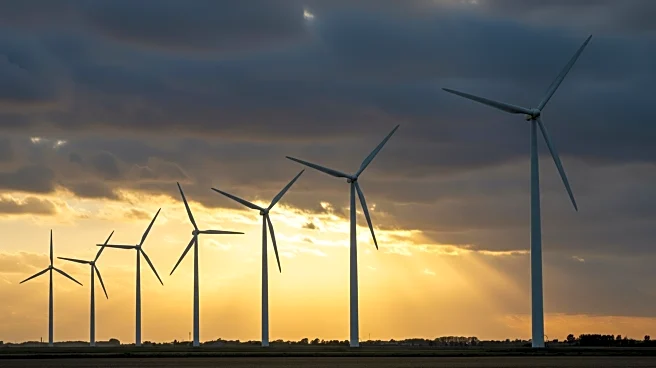What's Happening?
Renewable energy advocates are preparing to challenge the Trump administration's approach to wind energy development, citing legal vulnerabilities. The administration has been accused of using the Migratory Bird Treaty Act (MBTA) to favor fossil fuels over renewables. Historically, the MBTA has been interpreted to prevent accidental bird killings, but the Trump administration has sought to reinterpret the act to benefit the oil industry. This has led to legal disputes, including a lawsuit led by New York and 17 other states against the administration for halting wind energy approvals. Advocates argue that the administration's actions are arbitrary and capricious, targeting renewables while loosening regulations for fossil fuels.
Why It's Important?
The legal challenges against the Trump administration's wind energy policy could have significant implications for the renewable energy sector in the U.S. If successful, these challenges may lead to a shift in policy that favors clean energy development, potentially reducing reliance on fossil fuels. This could impact the energy market, influence environmental policy, and affect the economic interests of both renewable and fossil fuel industries. The outcome of these legal battles may also set precedents for how environmental laws are interpreted and enforced, affecting future energy projects and conservation efforts.
What's Next?
The legal proceedings initiated by states and environmental groups are expected to continue, with potential for more lawsuits challenging the administration's policies. The Interior Department's review of wind turbine-related bird deaths under the MBTA may lead to further scrutiny and regulatory changes. Stakeholders in the renewable energy sector are likely to monitor these developments closely, considering both legal and strategic responses. The administration's ability to justify its policy changes in court will be crucial in determining the future of wind energy development in the U.S.
Beyond the Headlines
The Trump administration's approach to wind energy highlights broader issues of environmental policy and regulatory interpretation. The use of the MBTA to target specific energy sectors raises questions about the balance between conservation and energy development. This situation underscores the ongoing debate over the role of government in promoting sustainable energy solutions while addressing economic and environmental concerns. The legal challenges may also influence public perception and political discourse around energy policy and environmental protection.









